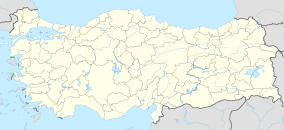Gediz Delta
| Gediz Delta | |
|---|---|
 The Gediz River Delta on a bright afternoon. | |
| Location | İzmir Province, Turkey |
| Nearest city | İzmir |
| Coordinates | 38°31′N 26°53′E / 38.517°N 26.883°E |
| Area | 14,900 ha (58 sq mi) |
| Governing body | Ministry of Agriculture and Forestry |
| Official name | Gediz Delta |
| Designated | 15 April 1998 |
| Reference no. | 945[1] |
The Gediz Delta is the river delta at the confluence of the Gediz River with the Gulf of İzmir, in İzmir Province in western Turkey. It is a 14,900 ha area of land that occupies coastal parts of Foça, Menemen, and Çiğli districts.[2] It is one of the largest areas of coastal wetlands in Turkey and has a biodiversity of plants and birds.[2] It is a Ramsar site since 1998 and an Important Bird Area since 2000.[1][3] It is 26 km from İzmir city center.[2]
Flora and fauna
[edit]The delta is home to more than 250 bird species and hosts approximately 80,000 birds in winter.[2] It provides shelter for 10% of the world's flamingo population.[4]
History
[edit]Remains of the former Ionian town of Leucae is located on the delta.[2]
Economy
[edit]Çamaltı Salt Pan, which is located on the delta, provides one third of Turkey's salt production.[2]
References
[edit]- ^ a b "Gediz Delta". Ramsar Sites Information Service. Archived from the original on 27 February 2017. Retrieved 16 May 2020.
- ^ a b c d e f "Information Sheet on Ramsar Wetlands" (PDF). Ramsar Sites Information Service. Retrieved 16 May 2020.
- ^ "Gediz Delta". BirdLife International. Retrieved 16 May 2020.
- ^ "Gediz Deltası" (in Turkish). Doğa Derneği. 4 September 2015. Retrieved 16 May 2020.
Further reading
[edit]- Scaramelli, Caterina (2021). How to Make a Wetland: Water and Moral Ecology in Turkey. Stanford: Stanford University Press. ISBN 978-1-5036-1385-0.
External links
[edit] Media related to Gediz Delta at Wikimedia Commons
Media related to Gediz Delta at Wikimedia Commons

